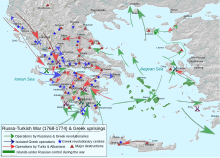You can help expand this article with text translated from the corresponding article in Greek. (March 2017) Click [show] for important translation instructions.
|
| Orlov revolt | |||||||
|---|---|---|---|---|---|---|---|
| Part of the Russo-Turkish War of 1768–1774 | |||||||
 Operations during the Russo-Turkish War (1768–1774) and Orlov revolt (1770) | |||||||
| |||||||
| Belligerents | |||||||
|
Supported by: | |||||||
| Commanders and leaders | |||||||
|
|
| ||||||
| Units involved | |||||||
|
|
Ottoman Muslim Albanian mercenaries Local Turks | ||||||
| Strength | |||||||
| Unknown |
| ||||||
| Casualties and losses | |||||||
| Unknown | Unknown | ||||||
The Orlov revolt[a] (Greek: Ορλωφικά, Ορλοφικά, Ορλώφεια, lit. 'Orlov events') was a Greek uprising in the Peloponnese and later also in Crete that broke out in February 1770, following the arrival of Russian Admiral Alexey Orlov, commander of the Imperial Russian Navy during the Russo-Turkish War (1768–1774), at the Mani Peninsula. The revolt, a major precursor to the Greek War of Independence (which erupted in 1821), was part of Catherine the Great's so-called "Greek Plan" and was eventually suppressed by the Ottomans.
- ^ Brill, E. J. (1993). E.J. Brill's First Encyclopaedia of Islam: 1913-1936. A - Bābā Beg. BRILL. p. 458. ISBN 978-90-04-09787-2.
- ^ Jazexhi, Olsi (2018). Kara Mahmud Pashë Bushati, Bualli i Shkodrës (1776–1796 ER/1190–1211 AH) (PDF). Dielli. pp. 4, 11. Archived (PDF) from the original on 2018-08-19. Retrieved 2023-10-31.
- ^ Jazexhi, Olsi (2018). Kara Mahmud Pashë Bushati, Bualli i Shkodrës (1776–1796 ER/1190–1211 AH) (PDF). Dielli. pp. 4, 11. Archived (PDF) from the original on 2018-08-19. Retrieved 2023-10-31.
- ^ Brill, E. J. (1993). E.J. Brill's First Encyclopaedia of Islam: 1913-1936. A - Bābā Beg. BRILL. p. 458. ISBN 978-90-04-09787-2.